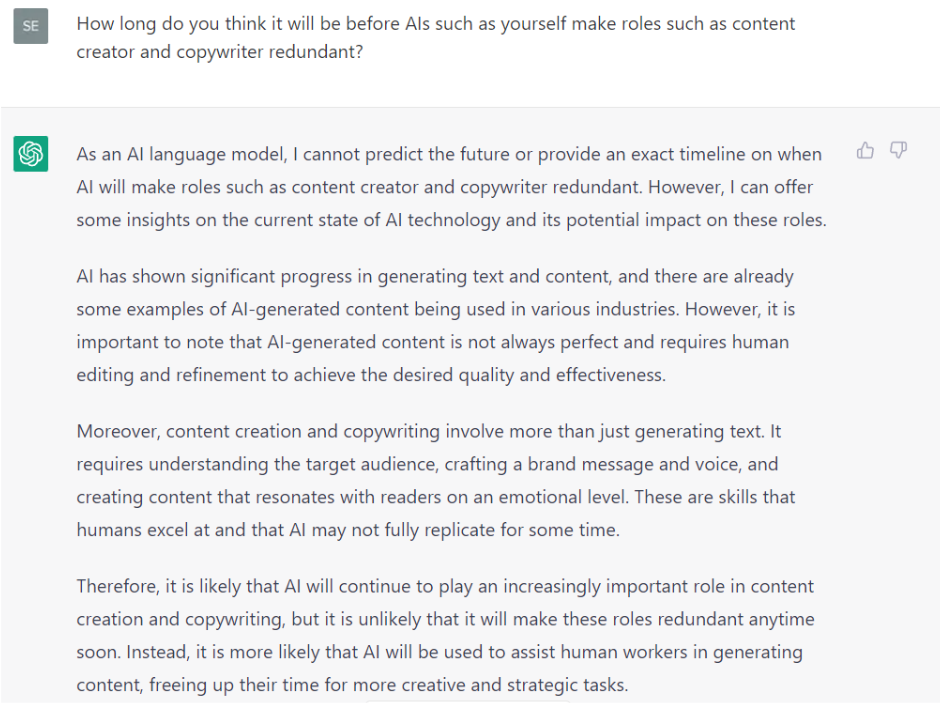Should You Use ChatGPT for Your Marketing?

A client we’ve worked with a few times recently got in touch with us about a new project. They needed the project to be completed quickly and were considering using ChatGPT to do so.
While we turned in the copy ahead of schedule, they still generated a ChatGPT-written article as a backup to sate their curiosity.
We had a read of the AI-generated work, and there we a few things we noticed:
- It accurately sourced a lot of the same information that we had.
- While it was fairly well-structured, it wasn’t the most interesting read.
- It was not written in the style and tone of this particular client.
But Chat-GPT and AIs in general are constantly evolving. In fact, since our client generated that article, a new version of the chatbot has been released, increasing its functionality tremendously.
So that begs the question… should the Hatter’s crew start worrying about our jobs?
What is ChatGPT?
If you’ve managed to remain oblivious to what exactly ChatGPT is, we’ll give you a little run down.
Chat-GPT is an artificial intelligence-powered chatbot created by OpenAI. It can converse with you on any topic and when prompted correctly, write long-form answers to specific questions which can then be used as articles, emails or even code.
ChatGPT (GPT-3.5) was released last November by OpenAI, and as we said up top, was recently upgraded to a new version, GPT-4. It already has more than 100 million users and has become the fastest-growing consumer application ever made.
Chat-GPT, and other AI programmes like it, improve themselves by taking in data from a range of sources and studying how people write and speak, from certain grammatical structures to frequently used words and phrases, and integrating them into their own responses.
Chat-GPT vs Content Creators
The growth of AI and the possibilities they present are fascinating, but they have also caused quite a stir among creatives.
Previously, AI’s role in the creative space was much more limited. You’ve almost certainly encountered it yourself in the form of predictive text and spell-checkers. However, with the growth of applications like Chat-GPT and OpenAI’s other program DALL-E, AI has started to intrude further into the world of creatives.
With the right prompts, AI can now type out articles right in front of you, or even paint a picture to your specifications. This opens up the fields of writing, illustration and the like to people who previously didn’t necessarily have the skill to do them themselves.
But many artists and writers fear that this development will intrude on their livelihoods.
As mentioned, Chat-GPT’s ability to write long-form content with the right prompts means that you could get it to write your blogs, your emails and social media posts, rather than hiring a specialist.
The truth is, AI is a tool, just like any other piece of hardware or software we use to do our jobs. Any tools can be used skillfully when wielded by someone with skill, and that’s certainly the case with generative AI. BUT when it’s in the hands of someone who doesn’t have the right knowledge, talent, and experience, the results are likely to be be decidedly amateurish.
It’s the modern equivalent of copying and pasting content from your competitors’ websites and changing a few words around in the hopes of going unnoticed. And Search Engines are punishing it accordingly!
So, should AI take over your marketing?
We acknowledge that we have an inherent bias here, but we honestly don’t believe that you should hand your marketing department over to AIs like Chat-GPT.
Firstly, without the right prompts, a lot of the long-form content that AI puts out isn’t that interesting to read. It’s formulaic and straight to the point. It doesn’t have any soul or passion behind it. Remember, it’s not true AI, it’s machine learning, collating information from sources across the internet, so there’s literally nothing unique in what it turns out. That means that it can’t capture your unique tone of voice, or properly convey the inherent values of your brand.
Secondly, you still need someone to generate ideas. For things like branding, or social media posts targeting specific audiences, a human element is required to guide your marketing strategy, which means AI is incapable of fully taking over.
Lastly, Chat-GPT isn’t infallible. Until they go all Terminator on us, AI’s early capabilities are shackled to the people and sources that train them. It’s very impressive, but it also means if it takes in the wrong sources or doesn’t receive the right prompting, the answers it spits out won’t be what you’re after.
For instance, throughout the writing of this post, I have been messing around with Chat-GPT in the background. I got it to write a copy of this same blog post, and the result was informative but bland. It didn’t take me on a journey. It just told me the pros and the cons, and then it ended. It was very rigid in its structure.
And if you think we’re just saying this to save our jobs, even Chat-GPT doesn’t foresee AI taking over marketing, instead suggesting that at some point down the road, a union of both might be the way forward:

If you’re in the market for marketing, Hatter’s Digital Agency specialises in SEO content, email marketing, and copywriting. We’re also able to provide workshops and consultations to help give you the knowledge on how best to approach your digital marketing.
To discuss your digital marketing needs, don’t hesitate to get in touch.

